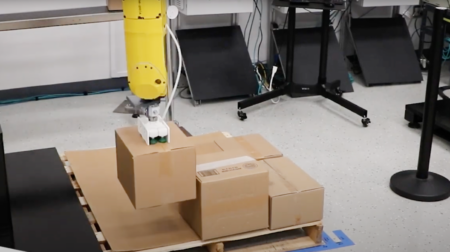A new UK robotics research centre will receive a share of £25m to improve collaborative technology and help businesses unlock the full potential of automated industrial manufacturing.
The Made Smarter Innovation Research Centre for Smart, Collaborative Industrial Robotics, led by Loughborough University, aims to advance smart manufacturing by eliminating barriers and accelerating widespread use of smart collaborative robotics technology. The project hopes to unlock the full potential of the UK industry in productivity, quality, and adaptability.
The centre will bring together a team from Loughborough University, Cranfield University, the University of Strathclyde, the University of Warwick, and the University of Bristol. Members all have experience in manufacturing, engineering, digital technology, robotics, human-factors, verification and safety, law, psychology, systems engineering, metrology, and ICT.
It also comprises of organisations from core UK industrial sectors including aerospace, automotive, agri-food, green energy, construction, and space.
Project lead Niels Lohse, of Loughborough’s Wolfson School of Mechanical, Electrical and Manufacturing Engineering, said:“While there is a huge appetite for the benefits of industrial automation, its full potential remains untapped. The perceived and actual high initial investment cost for specialised, automation equipment is a significant barrier for wider adoption.
“The need for highly specialised skill sets limits the design, implementation, and maintenance of automation. Specialised equipment is often too inflexible particularly for SMEs with modifications being either too expensive or impractical. People and automation are separated by inflexible safety, regulatory, procedural, physical, and psychological barriers preventing effective collaboration.
“Bringing the automation community together will be essential for addressing the unique challenges faced by UK industry to unlock the full potential of their highly skilled workforce through automation and digital technology.”
The research centre will create a multi-disciplinary, cross-sectorial hub setting the national research agenda in smart, collaborative industrial robotics, and aims to deliver the next generation of automated factories
It will focus both on research to seed new breakthrough technologies needed to make automation more responsive, collaborative, and safe as well as industry-initiated feasibility demonstration projects to raise awareness of emerging automation capabilities.
Lohse added: “I am very excited that our centre has received the support from nearly 50 national and international organisations including SMEs, large end users, technology providers, systems integrators, and research organisations. Even before the centre has been officially launched, more companies are looking to join.”
It is one of five university-led research centres which are being funded by UKRI and Made Smarter as part of a wider £300m partnership between government, industry, Catapults, and academia led by the Department of Business, Energy and Industrial Strategy Innovation Strategy.








